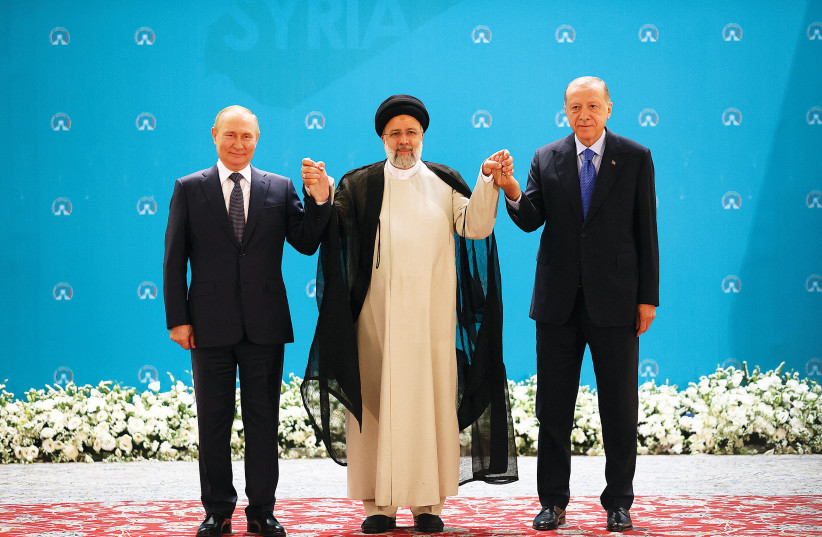The war in Ukraine has given Turkey the opportunity to improve ties with its decades-long foe, Armenia, as ally Russia is distracted by its full-scale invasion, analysts told The Media Line.
For more stories from The Media Line go to themedialine.org
There has been slow but steady progress in the normalization process between Turkey and Armenia, which both sides agreed to last year.
Their foreign ministers met in March; In July, the countries agreed to allow for air cargo flights between the two countries but did not set a start date, and recent reports say that Turkey is open to having its envoy travel to Armenia for meetings.
Emil Avdaliani, director of Middle East Studies at the Georgian think tank Geocase, told The Media Line that the war in Ukraine may have given Turkey more space to deal with Armenia because Russia has become more reliant on Ankara.
“This explains the urgency with which Ankara works on improving ties with Yerevan. Much could change if Russia wins in Ukraine. It could be less tolerant of Armenia's opening,” Avdaliani said. “I think we are seeing the opening of the South Caucasus. Russia will [no] longer be an exclusive leader in the region.”

Russian President Vladimir Putin and Turkish President Recep Tayyip Erdogan have strengthened ties over the years and Ankara has sought to mediate between Kyiv and Moscow since Russia invaded Ukraine in February.
Sanctions
While some of the world’s largest economies have sanctioned Russia, Turkey has not and has continued to engage in trade, including buying Russian gas.
Russia was the top source of imports for Turkey, reaching 16% of total imports in June, according to the Turkish government statistics agency.
However, Turkey and Russia also find themselves at odds in the Nagorno-Karabakh region where they support opposing sides in a dispute over control of the territory. The area is home to tens of thousands of ethnic Armenians but is within Azerbaijan’s borders. While Turkey has backed Azerbaijan, Russia has sided with Armenia.
A 2020 war left thousands dead and Azerbaijan, which was able to recapture land, was seen as the victor. There has been a recent escalation in tensions and clashes have broken out. Three soldiers were reportedly killed earlier this month.
“The escalation… is very much an open defiance of Russia by Azerbaijan and they’re getting away with it because of the Russian invasion of Ukraine,” Richard Giragosian, director of Armenia’s Regional Studies Center think tank, told The Media Line.
However, he says he does not believe an offensive stance by Azerbaijan is sustainable.
Atilla Yesilada, an Istanbul-based analyst and economist, told The Media Line that Armenia moving away from Russia would benefit Turkey both in terms of security and finances.
He said that as long as Armenia is in the Kremlin’s sphere, it will host advanced weapons from Russia, which poses a threat to Turkey.
If Ankara and Yerevan can normalize relations, that threat might decrease and Turkey could also enjoy a major economic boost by selling exports at a better price than Russia could to Armenia.
“If Armenia were to turn its economic face toward Turkey, then Russian exports and Russian influence in the region would suffer,” said Yesilada. “Russia is too preoccupied with Ukraine to stop the process, even if it is proceeding in a manner that’s not in line with Russian interests."
He added that normalization also would improve Turkey’s trade with the wider region, which would particularly benefit the poorer northeastern region of the country.
Erdogan has moved to warm ties with many countries in an attempt to attract foreign investment amid Turkey’s economic crisis which has seen the official inflation rate rise to about 80%.
The timing is particularly bad for the Turkish president as he faces national elections in less than a year, with polls showing he is behind multiple opposition politicians.
Giragosian cautioned that Armenia is too dependent on Russia for it to leave the Kremlin’s orbit.
He says that while Turkey’s economy would benefit from better ties, the sectors in Armenia that would profit would be owned by Russians, so Moscow would not be against normalizing relations.
Another lingering obstacle between Turkey and Armenia is Ankara’s refusal to say that the mass killings of Armenians in 1915 by the Ottoman Empire was genocide.
Last year, US President Joe Biden recognized their deaths as genocide, drawing strong criticism from both the Turkish government and its opposition.
Giragosian believes it is for the better for the US to remain on the sidelines of the two countries’ normalization process so that Russia does not feel the necessity to respond, but he says Washington should get involved if its NATO ally were to backtrack.
“Armenia-Turkey normalization to me is a bellwether test of what kind of Turkey we will see,” he said. “This is an indicator of the future of Turkey, whether more democratic and developed or going backwards.”
